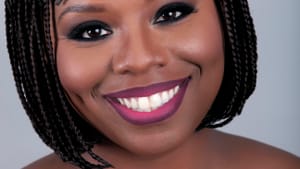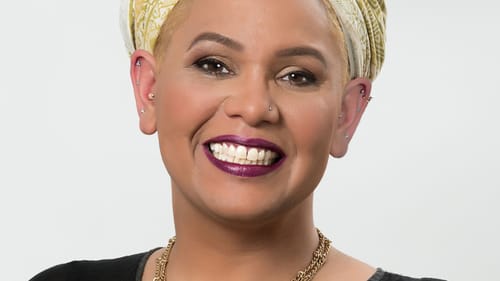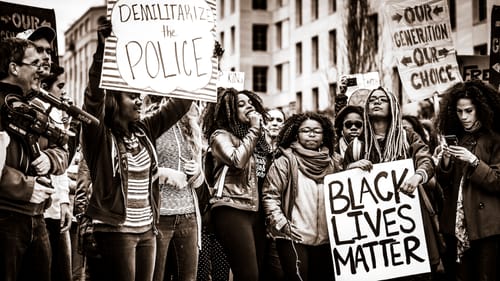Stay in the Loop
BSR publishes on a weekly schedule, with an email newsletter every Wednesday and Thursday morning. There’s no paywall, and subscribing is always free.
Women's work
'When They Call You a Terrorist: A Black Lives Matter Memoir,' by Patrisse Khan-Cullors

The official Black Lives Matter movement began when one community organizer posted to Facebook after the 2013 acquittal of George Zimmerman in the shooting death of 17-year-old Trayvon Martin. She wrote, “I continue to be surprised at how little Black lives matter.” Patrisse Khan-Cullors, coauthor of They Call You a Terrorist: A Black Lives Matter Memoir, responded, “#BlackLivesMatter.”
Write what you know
For Khan-Cullors, as for so many African Americans, the movement started before the Martin case. Maybe it was when a dozen police officers in riot gear raided her Los Angeles home. The cops held Khan-Cullors, her friend, and that friend’s six-year-old daughter at gunpoint while they rooted through the cottage without a warrant.
Or maybe it was when Khan-Cullors watched L.A. cops rough up her brothers and their friends — a bunch of kids just hanging out in the alleyway. “They throw them up on the wall,” she writes. “They make them pull their shirts up. . . . I watch, frozen. I cannot cry or scream.”
Black Lives Matter was a shout, a sob, an insistent rending of that silence. It was a hashtag that grew into a global network of locally led groups. It was the opposite of everything Khan-Cullors believed the world thought about black people, their value, and their humanity.
In the book, coauthored with journalist asha bandele, Khan-Cullors, who founded Black Lives Matter along with activists Alicia Garza and Opal Tometi, tells the movement’s origin story along with her own.
Lies and statistics
It’s a solemn tale of Khan-Cullors, raised in an L.A. barrio by a woman who always hustled two or three jobs — telemarketing, reception, child care —to feed her own four kids, and a father who lost his job when the GM plant closed, struggled with addiction, showed up and then vanished again, and whose hugs smelled of gasoline.
At 12, she learned of another father — her biological father, Gabriel, who also wrestled with addiction and whose families (biological kin and 12 step-soulmates) embraced Khan-Cullors.

She outlines a childhood veined with affection and terror. Also at 12, Khan-Cullors was arrested and handcuffed by police in front of her summer-school class, on the basis a rumor that she had marijuana in her bag (she didn’t, though she was already experimenting with it).
Several years later, her brother Monte — yet to be diagnosed with schizoaffective disorder — was arrested for attempted robbery and returned from jail traumatized, drugged to near-incoherence.
At a high school with a focus on arts and social justice, Khan-Cullors studied racism, classism, and homophobia. She learned that U.S. jails hold more people with mental illness than all our psychiatric hospitals combined. She learned that black students are suspended at rates that far outpace those of white students.
“By the time Black Lives Matter is born,” Khan-Cullors writes, “we not only know that we have been rendered disposable because of our lived experience — which few listened to — but also from data and finally from those terrible, viral images of black girls being thrown brutally out of their seats by people who are called School Safety Officers.”
Khan-Cullors’s book is replete with grim statistics. But its power lies in the particular: how racism, expressed in mass incarceration, the war on drugs, and the unchecked brutality of police officers, fractures families and crushes spirits. “There were almost no adults who were there, present to love and nurture and defend and protect us,” she writes. “There was almost no one to say our dreams and our lives and our hopes mattered.”
What to do?
Before reading this memoir, I thought of Black Lives Matter as the current, fierce iteration of a wave that began with abolition and swelled into the civil rights movement. I learned that BLM merely stands on the scaffolding of those earlier efforts. Its founders wanted something explicitly different: a movement led not by one charismatic, male, cisgender leader but instead guided by women, queer, and trans people.

Khan-Cullors and bandele point out the persistent sexism, homophobia, and transphobia that devalue queer people and women of color, both as activists and as victims of violence. While many Americans know of Eric Garner, Michael Brown, and Tamir Rice, far fewer can cite the names of women killed by police officers.
Last week, Khan-Cullors and bandele discussed the book at the Free Library, a conversation moderated by Temple University professor Marc Lamont Hill. They talked of politics — the KKK and prison expansion and Deferred Action for Childhood Arrivals. But mostly, it was a dialogue about love and grief. “Being close to one another and holding space for one another is just as important as figuring out what policies we’re going to change,” Khan-Cullors said.
Some have criticized Black Lives Matter for lacking leadership. But Khan-Cullors and bandele said the movement's decentralized structure was intentional. “We don’t believe in the idea of one single charismatic leader who’s going to take us to freedom,” Khan-Cullors explained. “That’s not how people get free. It takes all of us to get free.”
About 50 minutes into the authors’ Free Library appearance, someone asked the question I’d been thinking as I read the book: “What can white people do to support the movement for racial justice?”
Join an organization that’s already doing the work — for instance, the local chapter of Showing Up for Racial Justice, the women said. Dare to speak out against white supremacy. Be willing to learn from people of color. “You can first do this,” bandele said. “Listen. Deep, profound listening.”
What, When, Where
When They Call You a Terrorist: A Black Lives Matter Memoir. With authors Patrisse Khan-Cullors and asha bandele, moderated by Marc Lamont Hill. January 18, 2018, at the Parkway Central Library, 1901 Vine Street, Philadelphia. (215) 686-5322 or freelibrary.org.
When They Call You a Terrorist: A Black Lives Matter Memoir. By Patrisse Khan-Cullors and asha bandele. St. Martin's Press, 2018. 272 pages, hardcover; $16.50. Click here.
Sign up for our newsletter
All of the week's new articles, all in one place. Sign up for the free weekly BSR newsletters, and don't miss a conversation.

 Anndee Hochman
Anndee Hochman